For Hakka people in northern Taiwan, the Lunar New Year formally concludes with Tianchuanri (“Heaven Mending Day,” or “the day the sky broke”) on the 20th day of the first lunar month. Tianchuanri, which fell on Feb. 24 this year, is especially celebrated among Hakka people in Hsinchu County, with various celebrative events such as lantern parades, a mountain song contest, and the worship of the ancient goddess Nuwa.
In ancient Chinese mythology, the god of water, Gonggong, became jealous of people worshiping Zhurong, the god of fire, who taught people how to use fire, and started a fight with him. After being defeated, Gonggong smashed his head against one of the pillars holding up heaven, causing the pillar to collapse and Heaven to crack open. The crack in heaven brought torrential downpours and flooding to earth. Nuwa repaired the pillar and filled the cracks with rocks of five colors.
While the myth does not strictly originate from Hakka tradition, only Hakka people still celebrate the day of Nuwa’s mending of heaven. To commemorate Nuwa’s efforts, the Hakka have a tradition that “men are not allowed to till the land, and women are not allowed to weave textiles” on Tianchuanri.
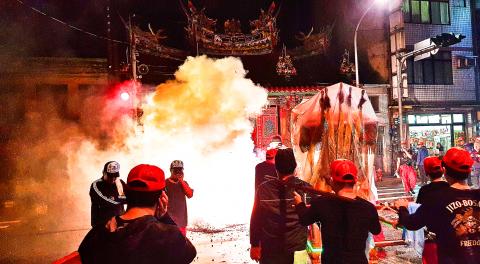
Photo: Chang Ho-ming, Taipei Times
照片:台北時報章厚明
Hsinchu County’s Sinpu Township, a historic Hakka settlement dating back over two centuries, has a long tradition of combining the Lantern Festival with Tianchuanri. According to local elders, people living at either end of the town’s main old street, Jhongjheng Road, would berate each other, venting their frustrations. The rule was that the attacks would be verbal, not physical, and some people would compose sarcastic poems to make fun of the other side. The two sides agreed not to extend the fighting beyond that day, and that no retribution would be sought after the Lantern Festival was over. People back then would make lantern carts with provocative words written on them and push them along the main street. Today, the tradition has evolved into a huge lantern parade.
(Chang Ho-ming, Taipei Times)
對於台灣北部的客家族群而言,農曆新年一直要到正月二十日的「天穿日」才算正式結束。今年的「天穿日」落在國曆二月二十四日,此節日特別受到新竹縣的客家族群重視,每年都會舉辦花燈踩街、唱山歌競賽,以及祭拜女媧等各式慶祝活動。
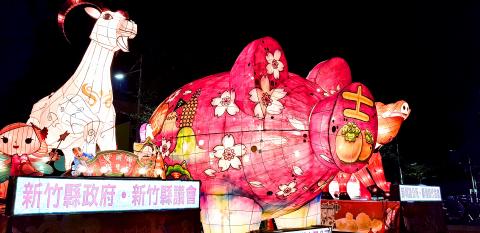
Photo: Chang Ho-ming, Taipei Times
照片:台北時報章厚明
在古老的中國神話中,水神共工看到火神祝融教導人類用火,受人們廣泛崇拜,不禁心生嫉妒,遂與火神交戰。共工遭到打敗後,深感挫敗,便一頭撞上支撐天庭的柱子,導致天柱崩塌,天庭破洞,引發豪雨和洪水。女媧不忍人類受災,遂修復倒塌的天柱,並煉出五色石補好天空。
嚴格來說,這段傳說並非直接源自客家傳統,但今日只有客家族群仍然會慶祝女媧補天。為了紀念女媧的付出,客家傳統上規定當天「男不耕田、女不織布」。
新竹縣的新埔鎮是歷史悠久的客家聚落,開墾歷史可上溯兩個世紀之久。當地有一項相當悠久的傳統,將元宵節和天穿日結合在一起慶祝。根據當地耆老所述,新埔老街中正路頭尾兩端的居民很久以前會在元宵節時,分成兩組人馬進行「罵街」,以「動口不動手」的方式宣洩平常的不滿,有時還會寫成相當文雅或讓人忍俊不禁的戲謔詩文。元宵節結束後,一切回歸正常生活,雙方不能尋仇。在當時,為了搏取眾人注意,有些人會做出小型的花燈,寫上激怒人的字句推在街上走。今日,這項傳統演變成為盛大的花燈踩街活動。
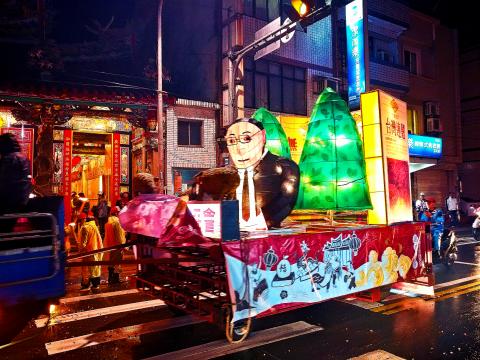
Photo: Chang Ho-ming, Taipei Times
照片:台北時報章厚明
(台北時報章厚明撰)
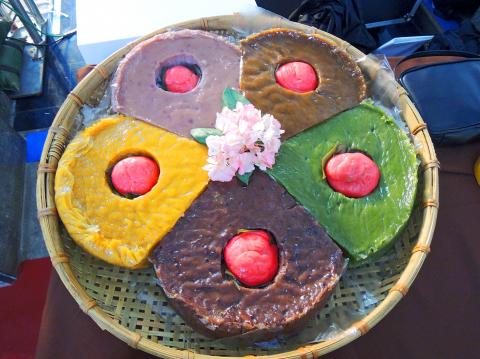
Photo: Hung Mei-hsiu, Liberty Times
照片:自由時報記者洪美秀

Long before numerals and arithmetic systems developed, humans relied on tally marks to count. These simple, repeated marks — often just straight lines — are one of the earliest and most widespread methods of recording numbers. Archaeological findings suggest that humans began tallying in prehistoric times. During the Late Stone Age in Africa, humans began to carve notches onto bones to create tangible records of quantities. One of the earliest known examples is the Wolf bone, an artifact unearthed in Central Europe in 1937. This bone bears notches believed to be an early form of counting. Even more intriguing

A: In addition to Teng Kai-wei, Taiwanese infielder Cheng Tsung-che was called up temporarily to play for the Pittsburgh Pirates in early April. B: Yeah, Cheng is the 18th player in Taiwan’s baseball history to be moved up to the majors. A: Back in 2002, Chen Chin-feng became the first Taiwanese to play in the Major League Baseball (MLB), followed by Tsao Chin-hui, Wang Chien-ming, Kuo Hung-chih, Hu Chin-lung and Lin Che-hsuan. B: Those pioneers were later joined by Lo Chia-jen, C.C. Lee, Ni Fu-te, Chen Wei-yin, Wang Wei-chung, Hu Chih-wei, Tseng Jen-ho, Lin Tzu-wei, Huang Wei-chieh, Yu Chang,
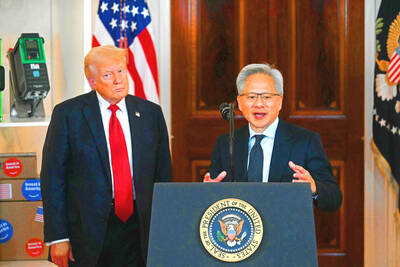
When Nvidia CEO Jensen Huang revealed on Friday last week that the company is working with the Trump administration on a new computer chip designed for sale to China, it marked the latest chapter in a long-running debate over how the US should compete with China’s technological ambitions. The reasoning has sometimes changed — with US officials citing national security, human rights or purely economic competition — but the tool has been the same: export controls, or the threat of them. Nvidia believes it can eventually reap US$50 billion from artificial intelligence (AI) chip sales in China. But it so far has

Continued from yesterday(延續自昨日) https://www.taipeitimes.com/News/lang In many Western countries, the most common form of tally marks employs a five-bar gate structure: four vertical lines followed by a diagonal slash. To form this group, one begins by drawing four parallel vertical lines, each representing one. For the fifth, draw a diagonal line across the existing four. This diagonal stroke effectively creates a distinct group of five. To continue counting, just initiate a new cycle in the same manner. A set of five tallies combined with a single vertical line next to it represents the number six. Across many Asian countries, the Chinese character